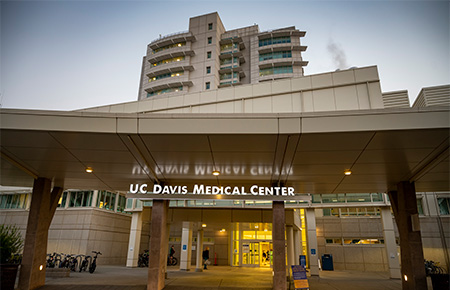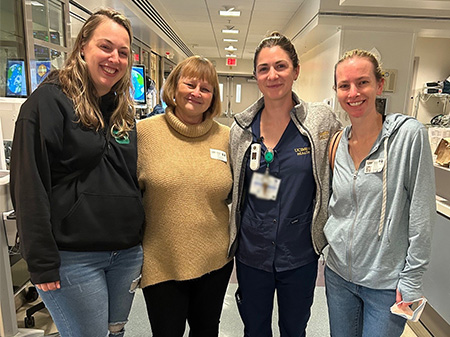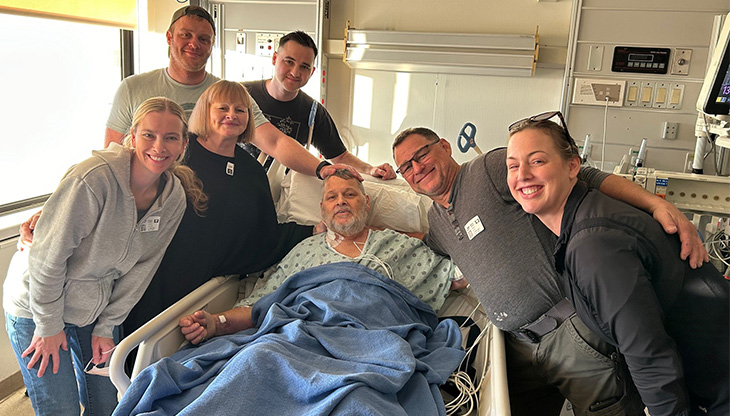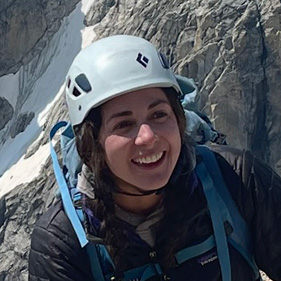It was an ordinary Sunday morning in November. Josephine Falvey, a nurse in the post-anesthesia unit at UC Davis Medical Center, was arriving at work. She attached her bicycle to the rack near the hospital entrance.
Suddenly, she heard a splash. A plastic coffee mug skittered across the sidewalk. The man holding it had collapsed.
The next seven minutes were the scariest moments Falvey had ever experienced as a nurse. Those same seven minutes would also save that man's life and health, against the odds.

On the ground, Richard Kreis convulsed in what appeared to be a seizure. Falvey turned him sideways and checked his pulse. None. She instructed his panicked wife Trish to go inside and find help. In the meantime, Falvey started chest compressions.
A former cardiothoracic ICU (Intensive Care Unit) nurse, Falvey is no stranger to high-pressure medical situations. But this was different. She was alone, without any monitoring equipment. "Not having a team of people to support you and be there for you, having to make those decisions on your own is so, so scary," Falvey said.
Soon Trish Kreis returned with two security guards, who called 911 and requested help over hospital radio. Hearing the call, Emergency Department (ED) staff mobilized and rushed to Richard Kreis' location.
When assistance arrived, Falvey had just finished her third round of CPR. Responders quickly got Richard Kreis on a gurney and rushed him to the ED, performing CPR the entire way.
Once there, a team of technicians, nurses, physicians, respiratory therapy and pharmacy employees treated him for cardiac arrest. To get his heart beating normally again, they performed defibrillation before attending physician James Chenoweth decided to administer Tenecteplase, a medication used to break apart blood clots.
Cardiologists then performed catheterization, threading a small tube through a blood vessel to the heart, identified the likely location of the blockage and implanted an arterial stent.
Life in limbo
Meanwhile, Falvey gathered herself up off the sidewalk. At some point during CPR, she had removed her bicycle helmet but not her backpack. In a daze, she headed inside to start her shift.
"I was honestly just so stressed out," she said. "I didn't know his name. I didn't know the outcome. I was wondering if I had done the right thing."

She had no idea Richard Kreis had survived and was currently stabilizing in the ICU.
Around the same time, Trish Kreis realized she didn't know the name of the nurse who had saved her husband's life. She asked for help locating his rescuer. Nursing Supervisor Leslie Buhlman sent a message to all charge nurses looking for the person who had performed CPR on the hospital sidewalk that morning.
"I got a call instantaneously," said Buhlman, who met up with Falvey and escorted her to the medical surgery ICU, where Richard Kreis was being cared for. There Falvey officially met Trish Kreis, who greeted her with a big hug and a smile. The physicians and care team also gathered to express their gratitude.
"It was very touching. It was the reason we're here," Buhlman said.
Relieved but still unsure of her husband's prognosis, Trish Kreis focused on his recovery. After a heart attack, a patient faces significant risk of neurological damage, especially the longer their brain goes without oxygen.
Even seven minutes might have been too much time.
A few days make a difference
By Thursday, Richard Kreis' breathing tube had been removed. His voice was hoarse and his throat sore, but his spirits were high.
"They said it was my kids," he winked, referring to the cause of his heart attack.

"We told him there's a less dramatic ways to get us all to visit: family vacation," said Kreis' son Chris. He and family friend Zach Black had flown in from Virginia and Alaska, respectively, and now stood bedside.
The mood was light for a reason. The family was hugely relieved at Richard Kreis' recovery, especially that he sustained no neurological damage.
"We didn't think we was going to make it," Trish Kreis said.
'Many miracles'
"True saves like this are pretty rare occurrences and wouldn't have been possible without the quick action of Josephine followed by the coordinated efforts of ED staff," Chenoweth said.
Those seven short minutes made the difference. How do they know it was seven minutes of emergency CPR? Because amid the chaos, before she started chest compressions, Falvey had the foresight to start a timer on her phone.
When she later learned that Richard Kreis was in the ICU cracking jokes, craving salmon and already planning his next trip to Disneyland, Falvey was speechless.
His recovery is the most incredible thing I've ever seen in my career as a nurse." -Josephine Falvey, PACU nurse
"I just feel completely shocked at the outcome of this. His recovery is the most incredible thing I've ever seen in my career as a nurse. I feel at a complete loss for words," she said.
The Kreis family has the words: Thank you.
"We are so grateful to Jo and for the many miracles we have been granted through this ordeal," said Trish Kreis. "We can't say enough good things about the Emergency Department personnel, the care Richard has received from all the staff and, of course, about Jo who literally saved his life."
The only casualty was a cup of coffee.







